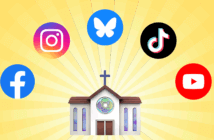Is your church calendar crammed with one event after another? Church consultant Tony Morgan says many congregations just keep scheduling the same events without ever evaluating whether they contribute to the congregation’s goals. He lays out a set of criteria for distinguishing between productive and unproductive events.
Many churches are over-programmed and event-driven. Generally, the thought behind all the events is that if we want people to take a next step, we need to get them in a certain place at a certain time and teach them. Then when people don’t show up to our events, we assume they are unspiritual or uncommitted. The truth is, by loading up our event calendars, we are asking people to make their lives more busy and complex.
Don’t continue scheduling events just because you’ve always done them. You will help more people take next steps without pulling them in too many directions.
That doesn’t necessarily mean that all events should be eliminated. I do believe there’s a place for events if they’re done right. It’s important to consider what distinguishes a healthy event from an unhealthy one.
Healthy Events |
Unhealthy Events |
| The win is helping people take the next step after the event. | The win is getting people to show up for the event. |
| The target audience is people who haven’t connected to the church or ministry. | The target audience is people who have already connected to the church or ministry. |
| The primary way people hear about the event is through the invitation of a friend. | The primary way people hear about the event is through promotions. |
| Volunteer teams own the event. | Staff teams own the event. |
| Events are prioritized so people are encouraged to stay connected in their other community engagements. | Events are scheduled to force people to choose church over other community engagements. |
| Since guests are expected, every element of the experience is planned with that in mind. | Since guests are not expected, certain elements don’t need as much attention. |
| You capture pictures and video to share the stories of people who were impacted by the event. | You capture pictures and video to share the story of the event itself. |
| After the event, there’s a debrief to make sure the win is accomplished. | After the event, you communicate how many people showed up. |
| Every year the event is evaluated to make sure it is still fulfilling its primary purpose. | Every year the event is scheduled because it’s expected. |
| The event is scheduled again to connect new people to church. | The event is scheduled again to keep people from leaving the church. |
If you haven’t in the past, it may be time to reevaluate the events your church offers in a given calendar year. I recommend listing every event, and then as a team, assessing whether each event is healthy or not.
Use this as an opportunity to simplify your approach to ministry. This may mean adjusting an unhealthy event so it can be moved to the healthy column. Or you may discover that it’s time to completely cut some unhealthy events from your calendar.
Whatever you do, don’t continue scheduling events just because you’ve always done them. If you’re willing to get serious about eliminating some events from your calendar, I can tell you from experience that you will help more people take next steps without pulling them in too many directions.
This article is reprinted from TonyMorganLive.com and used by permission.
Related Resources:
- Launching Sustainable Ministries by Ann A. Michel
- Bearing Fruit: Ministry with Real Results by Lovett H. Weems, Jr. and Tom Berlin
- Measuring What Matters: A Conversation about Metrics and Mission by Ken Carter







